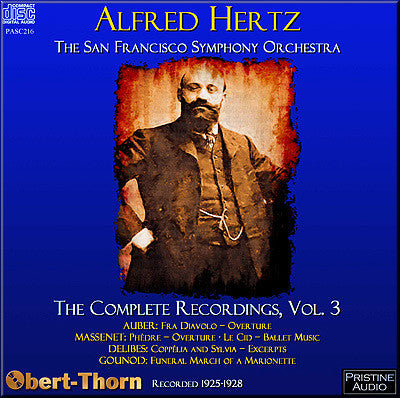
This album is included in the following sets:
This set contains the following albums:
- Producer's Note
- Full Track Listing
- Cover Art
Hertz in San Francisco, 1925-28: an all-French collection
Third of four volumes comprising the complete SFSO recordings
The present all-French collection offers examples of Hertz/San Francisco recordings from each year that Victor sent its engineers out to California to record them. Indeed, the very first recording the orchestra made is here (Fra Diavolo), as well as sides from their final session (Le Cid). It was during that first group of acoustic sessions that Hertz’s only still-unpublished recording with the orchestra was made: the Prelude to Le Deluge by Saint-Saëns, with the ensemble’s concertmaster (and Menuhin pedagogue) Louis Persinger as soloist. The tremendous advance made by the introduction of electrical recording is vividly illustrated by the two versions of the Phèdre Overture, made three years apart.
The sources for the transfers were American Victor copies – arch label (“bat-wing”) pressings for the acoustic items; “Z” pressings for the Gounod and Coppélia sides; pre-war “Gold” label pressings for the electric Massenet items; and wartime “Silver” label copies for the Sylvia items.
Mark Obert-Thorn
-
AUBER: Fra Diavolo – Overture (7:45)
Recorded 19th January, 1925 in Oakland
Matrix nos: PC 55-4 and 56-3
First issued on Victor 6506
-
MASSENET: Phèdre
Overture – Acoustic recording (9:17)
Overture – Electric recording (9:09)
Acoustic: Recorded 26th January and 2nd February, 1925 in Oakland
Matrix nos: PC 64-1 and 77-1
First issued on Victor 6539
Electric: Recorded 21st February, 1928 in the Scottish Rite Temple, Oakland
Matrix nos: PCVE 42012-2 and 42013-2
First issued on Victor 7154
-
DELIBES: Coppélia – Dance of the Automatons and Waltz (4:08)
Recorded 21st April, 1926 in Oakland
Matrix no.: PCVE 171-4
First issued on Victor 6586
-
DELIBES: Sylvia
Intermezzo and Valse Lente (3:16)
Pizzicati (2:11)
Recorded 24th April, 1926 in Oakland
Matrix nos.: PBVE 181-2 and 182-2
First issued on Victor 1166
-
GOUNOD: Funeral March of a Marionette (4:43)
Recorded 15th April 1927 in the Columbia Theatre, San Francisco
Matrix no: PCVE 253-2
First issued on Victor 6639
-
MASSENET: Le Cid – Ballet Music
1. Castillane (2:37)
2. Andalouse (2:20)
3. Aragonaise (1:43)
4. Aubade (1:00)
5. Catalane (3:02)
6. Madrilene (3:15)
7. Navarraise (3:01)
Recorded 27th and 28th February, 1928 in the Scottish Rite Temple, Oakland
Matrix nos.: PBVE 42033-42038, all second takes except 42035, Take 3
First issued on Victor 1406 through 1408 in album M-56
San Francisco Symphony Orchestra
conducted by Alfred Hertz
Producer and Audio Restoration Engineer: Mark Obert-Thorn
Cover artwork based on a photograph of Alfred Hertz
Total duration: 57:27
Fanfare Review
Treat yourself — I guarantee you won’t regret it.
This is the third and final installment in what has proved to be a revelatory series, notable both for its high standards of orchestral execution and interpretive individuality. It covers Hertz’s recordings of French music (the first two volumes were devoted to German repertoire from Beethoven to Wagner).
The Auber overture, recorded near the end of the acoustic period in January 1925, is played with great precision, refinement, and Gallic esprit. Massenet’s Phèdre was taken down at the same time, then remade electrically in 1928. Although the 1925 sessions are uncommonly vivid for acoustic recordings, the difference in three years is immense, and the 1928 recording captures the large orchestra with thrilling fidelity. The interpretation is elegant, fiery, and intensely dramatic, with playing of real sheen and polish—hear the improvisatory surge Hertz imparts to the second theme, conjuring an amazing soloistic flexibility from the massed strings, reminiscent of Mengelberg. The orchestra’s sonority is appropriately French rather than Germanic: organ-like, with sharply differentiated wind colors—in fact very recognizably the sharp, pungent textures familiar from Monteux’s later tenure with the orchestra. (Monteux took over as music director in 1936, and one of the ear-opening surprises of this series has been the discovery that that distinctive San Francisco sound was already fully developed in the Hertz years.) Fortuitously, a live 1950 performance of the overture with the French maestro exists (Music & Arts), and makes for a fascinating comparison, the two versions strikingly similar in sound and detail, Hertz a little more grandly spacious, Monteux more theatrically volatile. The Delibes excerpts are ideally piquant and spicy, though these earlier electricals from 1926 are notably less refined than the 1928 sessions (in 1926 they still used tuba to reinforce the string basses). Gounod’s satirical miniature makes a surprisingly indelible impression, with acridly pungent wind contributions. Massenet’s ballet music is done with unforgettable color, vibrancy, and panache; the 1928 recording is quite spectacular.
Mark Obert-Thorn’s transfers are superb. If you know the first two volumes, you’ll need no prompting from me. If you don’t, I recommend you treat yourself to all three—I guarantee you won’t regret it.
Boyd Pomeroy
This article originally appeared in Issue 34:2 (Nov/Dec 2010) of Fanfare Magazine.

